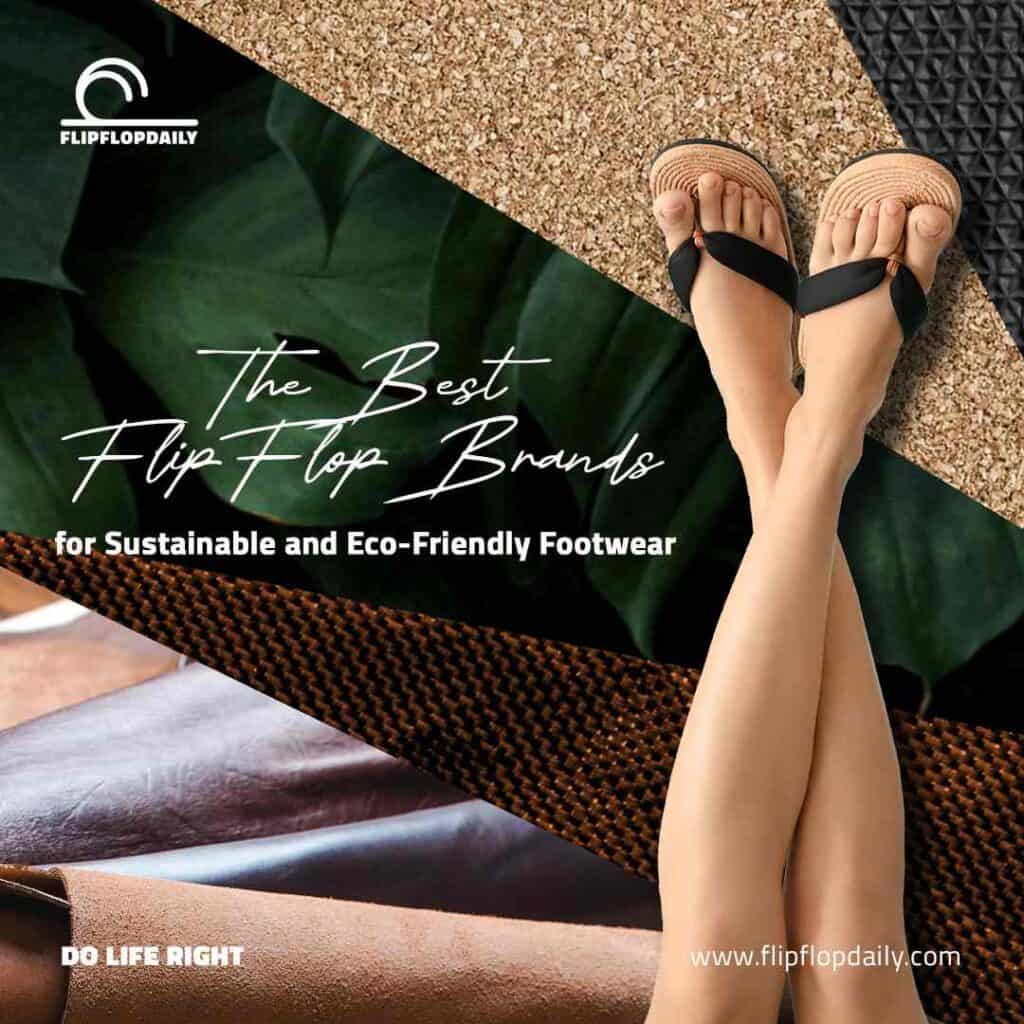Flip Flops are Forever
Flip flops are the ideal footwear for all types of occasions and activities due to their stylish designs, durability, comfort, convenience, and versatility. As such, they have stood the test of time and are still the go-to footwear for all generations. According to data from Statista, flip flops market share is 21 billion USD in 2022 and is projected to increase by 4% annually until 2025. In order to meet the demands of this billion-dollar industry, flip flops are mass-produced worldwide and made affordable for all consumers.
Environmental Impacts of Traditional Flip Flops
Most popularly worn at the beach, it’s no surprise that flip flops are often found floating around oceans or washed up on beaches all over the world. Unfortunately, these mass-produced flip flops are made from plastic, foam, and synthetic rubber which are non-biodegradable. Moreover, the plastics used to make traditional flip flops are sourced from fossil fuel petroleum. This production process not only depletes the Earth’s natural resources, but also releases greenhouse gases into the atmosphere, inducing global warming. Dyes and flame retardants used in manufacturing flip flops also contain toxic chemicals that are both harmful to the environment and to the workers at the assembly line. Furthermore, once these flip flops break down into microplastics, they pose as a threat to animals that accidentally ingest them.
The Best Flip Flop Brands for Sustainable and Eco-Friendly Footwear
The long-term environmental impact of conventional flip flops cannot be ignored. The production of traditional flip flops involves harmful materials and unsustainable practices. Thankfully, a new wave of eco-friendly flip flop brands has emerged, prioritizing social and environmental responsibility. These brands have set themselves apart by implementing sustainable practices throughout their manufacturing processes. Let’s delve into the key aspects that make them stand out and appeal to the socially responsible consumers of today.
Asportuguesas, a Portuguese brand, is committed to creating sustainable footwear by using a 100% natural raw material from trees. The company manually extracts high-quality cork oak by doing everything by hand, without the use of power tools. This delicate task is executed by well-trained local workers who have studied an ancient art that has been passed down from previous generations. Cork can be harvested every 9 years without having to cut a single tree and without risking damage to the trees. This is because the cork oak is a unique self-regenerating tree. Cork captures and retains carbon dioxide from the atmosphere. Thus, their manufacturing process generates very little carbon emissions which helps keep the atmosphere clean. Additionally, Asportuguesas uses recycled and organic materials in their packaging, reducing waste and their overall ecological footprint. Furthermore, Asportuguesas creates more jobs for the local workers since they are exclusively in charge of extracting and manufacturing the footwear.
TIDAL New York, an American brand, has made a name for itself by producing flip flops with renewable soles. Their innovative flip flops feature thicker soles which are of the same quality as sneakers. These comfortable soles and straps made from renewable materials outlast the average flip flop, and therefore reduce the need to constantly replace disposable flip flops. TIDAL New York also prioritizes domestic manufacturing, supporting local artisans and reducing the carbon emissions associated with long-distance shipping.
Olukai, a Hawaiian-inspired company based in Irvine, California, specializes in creating footwear suitable for life by the ocean. The brand sources premium leather, recycled rubber, and synthetic materials to craft water-resistant and quick drying footwear. Olukai’s designs are inspired by the “Wet Sand Principle” wherein contoured footbeds cradle the heel, provide strong arch support, and have ample room for the toes to spread and move freely. The footwear is also decorated with authentic artwork which honors the island culture. Apart from the brand’s commitment to comfort and sustainability, it also puts a strong emphasis on giving back to the community. Olukai dedicates a portion of its proceeds to support the Ama Olukai Foundation, a private, non-profit organization in Hawaii that is committed to protecting the land and the ocean, serving the communities, and honoring and preserving Hawaiian culture and traditions.
Sea Sense Flip Flops from London is dedicated to reducing ocean plastic pollution by producing plant-based flip flops made from natural rubber. The rubber is ethically sourced from Vietnam forests by tapping rubber trees, ensuring that no tree is cut down in the process. The rubber is then colored with natural dyes and molded into beautiful flip flops. These flip flops made with natural rubber are soft, durable, anti-bacterial, shock-absorbent, and waterproof. Unlike plastic flip flops which end up in oceans and landfills, natural rubber flip flops are biodegradable and free of toxic chemicals which are harmful to the environment. Aside from offering a sustainable alternative, the company also actively contributes to cleaning up the oceans. For every pair of Sea Sense Flip Flops sold, 5.7 kg of plastic debris is collected from the world’s most polluted rivers and coastlines. From the manufacturing process to the clean-up campaign, Sea Sense Flip Flops creates jobs and pays fair wages to workers in developing countries.
Feelgoodz, based in Raleigh, North Carolina, is another brand that has mastered the ethical process of rubber tapping. Working with artisans in Thailand, they extract natural rubber to produce premium and sustainable footwear. Their trademark Zensole collection also features natural rubber outsoles that are made with recycled rice husks for added traction. This collaboration supports rice farmers in Vietnam. In addition to flip flops, Feelgoodz also creates woven textiles, Turkish towels, and other accessories by working with traditional weavers, knitting villages, and artisan communities in rural areas around the world.
Reef from Carlsbad, California is a well-established name in the footwear industry. The brand incorporates different natural materials such as cotton, cork, jute, and paper in crafting sustainable footwear, as well as recycled materials and sustainable leather and suedes. Reef also continues to innovate by sourcing new raw materials to significantly cut down waste. In 2020, Reef used 100% recycled polyester from used plastic bottles in making toe posts, linings, and sandal straps. In 2021, Reef replaced traditional petroleum oil for sugar cane to create renewable midsoles. Throughout the years, Reef has continuously launched new product features, developed bigger partnerships and campaigns, supported more artisans in developing countries, and implemented better conservation efforts and clean-up initiatives.
Sustainability is the Future
In a world where the consequences of climate change and environmental degradation are becoming more apparent, supporting companies that prioritize sustainability is a powerful way for consumers to make a positive impact. These eco-friendly flip flop brands not only offer stylish and comfortable footwear, but also actively contribute to mitigating the environmental impact of the fashion industry. By utilizing sustainable materials, supporting fair trade, promoting recycling, and engaging in environmental initiatives, these brands are leading the way towards a more sustainable future.
What should you look for in Sustainable Flip Flops?
Natural and Recycled Materials
One of the key reasons these brands stand out is their use of innovative and eco-friendly materials. By incorporating materials like cork, recycled plastics, natural rubber, and sustainable leather, these brands reduce the demand for virgin resources such as natural gas and crude oil and contribute to the reduction of waste and pollution. Moreover, these materials often boast a lower carbon footprint compared to their conventional counterparts.
Ethical Practices
In addition to using sustainable materials, these brands prioritize responsible manufacturing practices. They strive to minimize their carbon emissions, reduce water usage, and employ ethical labor practices. They have also actively implemented measures to ensure fair wages, provide safe working conditions, and maintain support to local communities. By operating with transparency and accountability, these brands create stable jobs and help boost economic growth in developing countries.
Environmental Initiatives
These brands are actively engaged in environmental initiatives and support causes aligned with their values. Whether it’s organizing beach clean-ups, supporting conservation organizations, or investing in education and awareness programs, these brands go beyond their products to make a tangible difference. For every pair of flip flops sold, a portion of their profits directly goes into funding various social and environmental causes, demonstrating their strong commitment in giving back to communities and to the planet.
Do your part to save Mother Earth
Invest in a pair of sustainable and eco-friendly flip flops today. They’re a little bit more expensive than traditional flip flops, but ultimately, they’re worth it. Aside from being good for the environment, they’re also good for your feet. Flip flops made from natural materials are softer, more comfortable, and more durable. By choosing flip flop brands like Asportuguesas, TIDAL New York, Olukai, Sea Sense Flip Flops, Feelgoodz, and Reef, you have the power to make a positive impact on society and the environment. Choose to support companies that share your vision for a better future, setting a new standard for the fashion industry. As more socially responsible companies emerge, we can hope for a future where sustainability and style go hand in hand.



